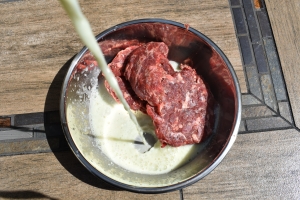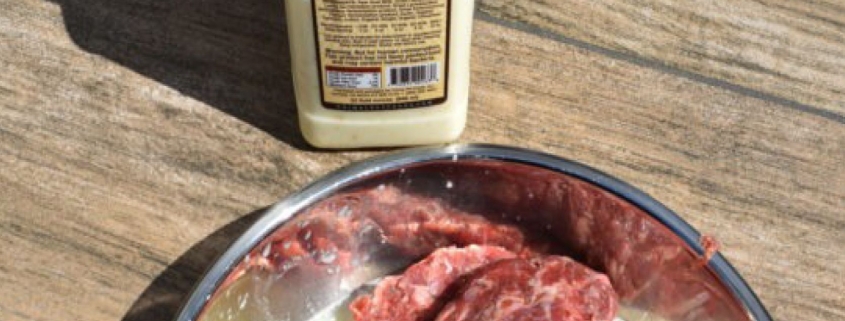The Truth About Feeding Your Pet Raw Goat Milk
If you’re looking for a natural supplement to enhance your pet’s nutrition and hydration, raw goat milk can be an excellent option. This milk is often added to kibble, canned, and raw pet food to provide additional health benefits. Unlike pasteurized milk, raw goat milk retains essential nutrients and probiotics that can aid common digestive issues in pets. However, it’s crucial to keep in mind that consuming unpasteurized milk poses a higher risk of exposure to harmful pathogens. In this blog post, we will explore the scientific evidence supporting the use of raw goat milk as a dietary supplement for cats and dogs.
Truthfully? It’s Both Fact & Fiction
Many pet food companies claim that goat milk can be a miracle cure for digestive problems, allergies, and even appetite stimulation. However, these claims are not backed up by any scientific studies or peer-reviewed research specifically focused on cats and dogs. Of particular concern is the recommendation to use goat milk as a sole milk replacement for orphaned puppies and kittens. This is not a safe or sufficient source of nutrition, as we will explain below. While goat milk does have some benefits, it’s important to be aware of the misinformation that can surround it.
Goat milk is indeed different from cow milk and can be easier to digest due to its smaller fat globules.2 In addition, it contains a wide range of vitamins, minerals, enzymes, and fatty acids that could potentially boost your pet’s immune system and help with common allergy issues. However, there is a lack of published research to support these anecdotal claims of benefit for cats and dogs consuming goat milk.
Is Goat Milk Complete and Balanced for Cats & Dogs?
As a supplement to a complete and balanced diet, goat milk and milk products have the potential to provide benefit. However, this should not be considered as the sole source of nutrition. The major reason for this is because goats are ruminants. The word ruminant comes from the Latin word ruminare, which means “to chew over again.”3 Ruminants are mammals that eat a plant-based diet. We know that dogs and cats are omnivores and carnivores respectively, and their diet is therefore vastly different. Because their diet is different, the composition of their milk will also be different from that of another species. Considering this it is important to note that goat milk is inadequate to nutritionally sustain other infant species on its own.
For orphaned puppies and kittens, or those that need supplementation it is best to consider a balanced milk replacer or finding a species appropriate milk donor.4
Nutrient Content of Various Species Milk
Comparing the nutrient content of milk from dogs, cats, cows and goats we can consider the following5:
- Fat contained in cow and goat milk is less than half that in dog and cat milk
- Protein contained within cow and goat milk is less than half that in dog and cat milk
- Calcium & phosphorus content of cow and goat milk is significantly lower than that of dog and cat milk which can risk deficiency and proper skeletal development
- Lactose amounts are higher in cow and goat milk than in cat and dog milk. This can cause diarrhea and dehydration leading to further complications.
- Because the fat content of cow and goat milk is much lower than cat and dog milk, the calorie content is also significantly lower. This means that dogs and cats, especially puppies and kittens would not adequately be able to consume all of the calories and nutrients necessary for proper growth and development
- Per this chart, the analysis of cat and dog milk is closer to each other than either cow or goat milk
Not All Bad News
The above points do not negate the practice of feeding goat milk products to pets. In fact, especially for kibble fed pets, raw goat milk provides increased moisture intake, which can improve digestion. Probiotic benefits of raw goat milk also cannot be ignored. Goat milk can also entice picky eaters since dogs and cats both love the taste. It can be used intermittently, or during fasting for those pets who may need light or bland meals due to certain conditions. While most pets can benefit from raw goat milk as a dietary supplement, it is potentially most beneficial for pets with digestive issues and those in need of immune support.
Raw goat’s milk can be given to your pet by itself as a treat, as a topper for raw food, canned food, or over kibble.
About the Author: Nicole Cammack
Nicci is the owner of award-winning NorthPoint Pets & Company, in Connecticut. She is also the Founder & CEO of Undogmatic Inc. Her undergraduate and graduate education includes biology, chemistry, business, and nutrition. She has worked in the pharmaceutical industry on multiple R&D projects and has had the privilege to learn from leading international figures in the human and pet health industry. She regularly lectures at national conferences, including federal, state, and municipal K9 events. Her current research involves identifying pathogenic risk factors and transmission among raw fed pets through a comprehensive worldwide survey.
www.northpointpets.com
www.undogmaticinc.com
References:
1. Katafiasz AR, Bartlett P, Lansing E. Motivation for Unpasteurized Milk Consumption in Michigan, 201. :5.
2. Lad SS, Aparnathi KD, Mehta B, Velpula S. Goat Milk in Human Nutrition and Health – A Review. Int J Curr Microbiol Appl Sci. 2017;6(5):1781-1792. doi:10.20546/ijcmas.2017.605.194
3. Latin Definition for: rumino, ruminare, ruminavi, ruminatus (ID: 33778) – Latin Dictionary and Grammar Resources – Latdict. Accessed June 6, 2020. https://latin-dictionary.net/definition/33778/rumino-ruminare-ruminavi-ruminatus
4. Can goat milk be used as a milk replacer for puppies and kittens? University of Wisconsin Madison Shelter Medicine Program. Accessed June 6, 2020. https://www.uwsheltermedicine.com/library/resources/can-goat-milk-be-used-as-a-milk-replacer-for-puppies-and-kittens
5. Hand et. al. Small Animal Clinical Nutrition. 5th ed. Mark Morris Institute






